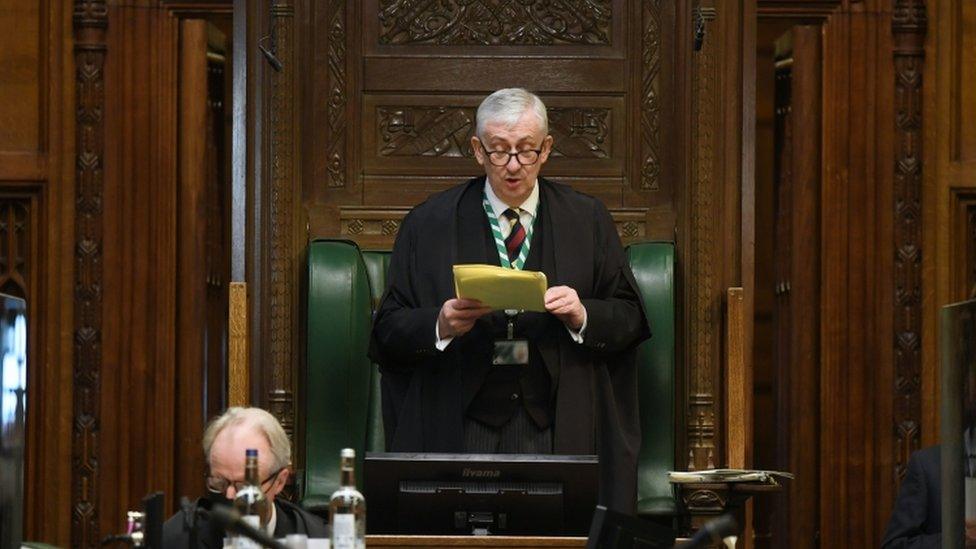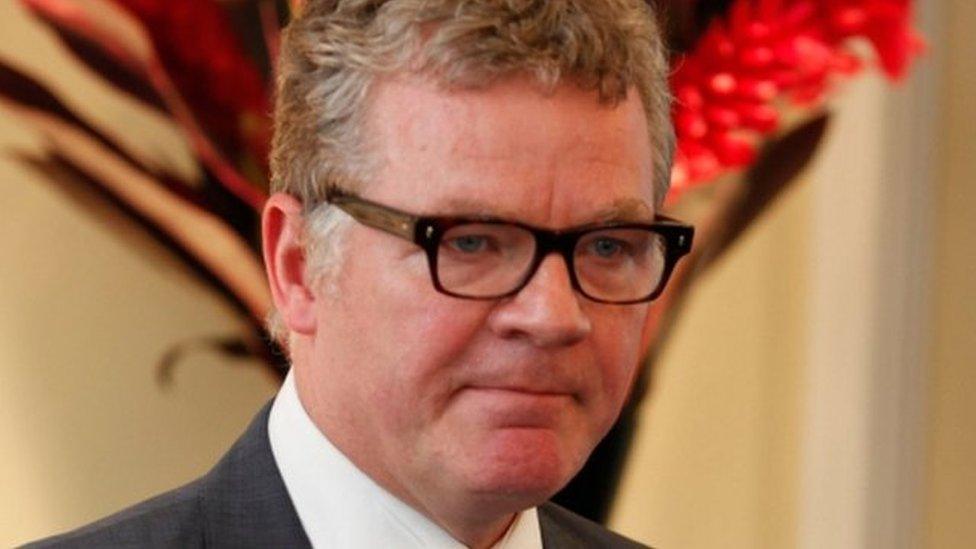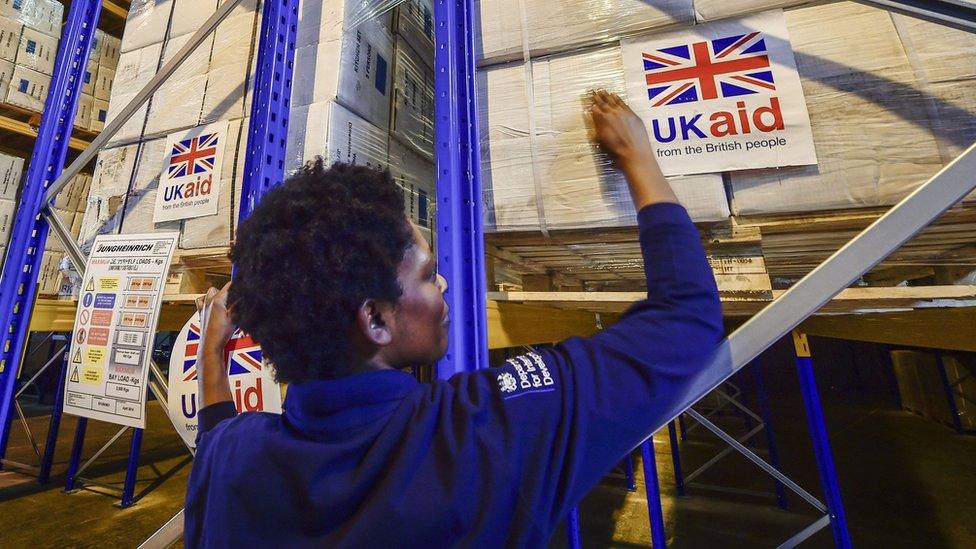The week ahead in Parliament
- Published

Parliament almost feels on pause at the moment.
As the country awaits the next lockdown announcements, MPs and peers churn through some relatively routine scrutiny work.
Looming on the Westminster horizon are some major Home Office measures - the Police, Crime, Sentencing and Courts Bill, external has completed Committee stage and will be back on the floor of the Commons in July - and there will be the debut of the highly contentious Sovereign Borders Bill, external, where Labour are already honing hostile amendments.
The week features a series of Estimates Day debates, where MPs get a rare chance to vote on the way the government spends public money - but only is a very limited way.
It's a rather good example of how little traction the Commons has on financial matters.
What happens is that the Backbench Business Committee hears bids to debate specific aspects of government spending, usually ones that have been highlighted by select committees, and then that leads to very specific issues being considered; in this case, spending on education recovery, and on building safety, and later in the week on foreign aid.
These are all areas that have been sharply controversial, but the House will not have the power to restore the cut to aid spending, or to insist more be spent on education recovery or on removing combustible cladding.
MPs only have the power to reduce spending; they can't exceed the spending envelope set by the Treasury because that would infringe the financial privilege of the government.
And like all Oppositions with hopes of entering government, Labour will not be keen to set any precedents around tinkering with spending plans, for fear they will eventually be used against them.
So while ministers will face another airing of familiar issues, they need not fear a vote - the House is unlikely to want to take the nuclear option of defeating an estimate and thereby defunding some spending programme entirely.
Here's my rundown of the week ahead:
Monday 28 June

MPs begin their week (14:30) with Work and Pension questions - which may well be followed by urgent questions or government statements on issues arising over the weekend
The scheduled main business is the second reading of the Rating (Coronavirus) and Directors Disqualification (Dissolved Companies) Bill, external - postponed from June 15th, when it was bumped to make way for debates on extending COVID restrictions.
It's the sort of legislation that makes you wonder if the government is planning to drop something more substantial onto the agenda at short notice.
The bill deals with the impact of the coronavirus pandemic on business rates, and also makes it easier to investigate misconduct by directors of dissolved companies - allowing the Insolvency Service to can seek a disqualification order against a director of a defunct company, without first needing to go through the time consuming process of restoring the company.
The bill is intended to have retrospective effect so it can be applied to companies that were dissolved prior to the legislation coming into force, so that it can cover companies inappropriately wound up after receiving Bounce Back Loans.
The Lib Dems have put down an amendment to block the measure, because they believe the impact of its domestic rating provisions are unfair, and retrospectively limit businesses rights to challenge their rates bills.
The adjournment debate, led by the Conservative, Richard Fuller, could echo Conservative woes around HS2; it's about the impact on his constituency of plans to create a rail link between Oxford and Cambridge.
In Westminster Hall (16:30) there are debates on petitions calling for "Fern's Law," the compulsory microchipping of pets, to reunite stolen dogs, cats.
The petition, which has more than 112,000 signatures, says: "Many missing microchipped pets are never reunited as it's optional to scan and check microchip registration. It's time veterinary professionals, authorities and rescues checked pet & keeper match on the original database at a pets 1st consultation or yearly check-up. It's their only chance to get home."
Then, (18:15) MPs debate a petition Black History and cultural diversity in the school curriculum: "Teach Britain's colonial past as part of the UK's compulsory curriculum".
This petition, which attracted 268,000 signatures, calls for primary or secondary school students to learn about Britain's role in colonisation, or the transatlantic slave trade.
The debate follows a series of joint evidence sessions held by the Petitions Committee and Women and Equalities Committee last year, which heard from petitioners, experts and academics on the need for change, evidence which was then put to the Schools Minister, Nick Gibb.
The Petitions Committee also surveyed the views and experiences of teachers, school staff and home educators and found that 90 per cent of respondents felt there should be a statutory requirement for all children to be taught explicitly about the history of Britain's ethnic and cultural minorities, including Britain's role in colonisation and the transatlantic slave trade.
On the Committee Corridor Public Accounts (14:30) looks at progress with defence estate disposals, with evidence from senior civil servants at the Ministry of Defence , and Procedure (16:15) hears from the Leader of the House of Commons, Jacob Rees-Mogg, on procedure under coronavirus restrictions
In the Lords (13:00) ministers face questions on the proportion of hospital patients referred to residential accommodation during the pandemic, that were tested for COVID-19 prior to discharge; the Russian military build-up in the Arctic, and on the practicalities of reforming the law on religious marriage.
And there's an intriguing question from the Conservative, Lord Moylan on the construction of an underground Maglev (magnetic levitation) rapid train system between cities in the north of England.
Then Peers return to the detail of the Environment Bill, with Day 3 of committee stage consideration (remember this means issues are tested, but votes are almost never held).
The debate will focus on the political independence and enforcement powers of the Office for Environmental Protection, including whether it should set its own budget.
Tuesday 29th June

Sir Kevan Collins said the funding for school recovery "does not come close" to what was needed
The Commons begins its day (11:30) with an hour of Justice questions
Then, the SNP's Patricia Gibson presents the first Ten Minute Rule Bill of the new session of Parliament, on paid bereavement leave.
The main debate is the first Estimates Day, on the estimates for the Department for Education's plans to support education recovery (in England).
It will probably feature quotes from the morning's Education Committee hearing (see below); that is followed by a debate on the Ministry of Housing, Communities and Local Government estimates on Building safety - the post Grenfell cladding issue.
The day's top committee action will be the appearance by the former Education Recovery Commissioner Sir Kevan Collins before the Education Committee (10:00) to talk about the Government's Covid catch-up plans and funding.
Sir Kevan quit earlier this month, after the Government announced £1.4billion funding for post-pandemic educational recovery, arguing that "significantly greater" funding was needed.
Environment, Food and Rural Affairs (14:30) questions the Defra Minister Lord Benyon in the final evidence session of its inquiry into moving animals across borders.
They will look at recent government announcements of new restrictions on puppy smuggling, and the new barriers to moving animals between Great Britain and Northern Ireland as a result of Brexit, as well as the Government's proposals to ban live animal exports for slaughter and fattening.
In the Lords (12:00) there are questions to ministers on reform of online gambling and hospital waiting lists,
The main legislative action is the Second Reading debate for the Telecommunications Security Bill, external.
The Bill puts new legal duties on telecoms firms to increase the security of the UK network, gives the government powers to exclude high risk vendors such as Huawei from providing infrastructure and remove any of their kit already installed.
It will mean firms face fines up to ten per cent of turnover or £100,000 a day for failing to meet the required security standards.
The Bill passed the Commons in the previous session of Parliament.
This will be followed by a debate on two Statutory Instruments (regulations or orders which are usually used to update the law, on a one-off vote), on the Economic Partnership Agreement between the UK and Cameroon, and on the Interim Trade Partnership Agreement between the UK and China.
Labour Peer Lord Grantchester will force a vote is expected on a regret motion against the UK-Cameroon SI. He will point to the complaining of the "truly horrific" human rights abuses by President Biya's regime, including extra-judicial killings, torture, destruction of property, fair trial violations, and inhumane and degrading conditions of detention.
And he will highlight the lack of parliamentary scrutiny for a trading arrangement which came into force on January 1st.
Wednesday 30th June

The Commons opens (11:30) with half an hour of Wales questions, before PMQs at Noon.
Labour's Tulip Siddiq has a Ten Minute Rule Bill on flexible working, and then MPs have their second Estimates Day debate, on the money allocated to the Foreign, Commonwealth and Development Office for Official Development Assistance and the British Council.
This will doubtless provide another chance for the group around the former International Development Secretary, Andrew Mitchell, to renew their attack on the cut to the aid budget, but, as noted above, they will not have any effective means of reversing it, even if they can muster a majority of the Commons behind their cause.
Committee action includes Human Rights (15:00) looking at the Youth Justice sections of the Police, Crime, Sentencing and Courts Bill
In the Lords (12:00) questions to minister include the Conservative Lord Ridley asking about the possibility that the COVID-19 virus escaped from a laboratory at the Wuhan Institute of Virology.
Labour's Lord Grocott - who has long campaigned to abolish the by-elections which replenish the 92 hereditary peers in the Lords - has a question on reform of the House of Lords.
Then it's day four of their lordships' yomp through the detail of the Environment Bill, which will cover chemicals, including the issue of animal testing

Thursday 1st July
Commons business begins (09:30) with forty minutes of Digital, Culture, Media and Sport questions, followed by the monthly mini-question time to the Attorney General, where Michael Ellis remains the locum for Suella Braverman, who is on maternity leave.
After that (blink and you'll miss it) there's the "consideration" of the The Supply and Appropriation (Main Estimates) Bill - in which MPs will approve billions of pounds of public spending in a matter of moments.
The main debates are on two issues chosen by the Backbench Business Committee,, on Windrush Day and on Pride Month.
On the Committee Corridor, Public Accounts (10:00) hears evidence from civil servants at the Department for Business, Energy and Industrial Strategy on Protecting consumers from unsafe products.
In the Lords (12:00) Peers question ministers on the future of Channel Four.
The main debates are led by Crossbench or Independent peers - with the former Lord Speaker, Lord Fowler leading a debate on the importance of the UK's foreign aid programme.
He is another senior ex-Tory minister who's critical of cuts to the aid programme, and the debate may feature some heavyweight legal opinion on whether the cuts are illegal under the Coalition-era legislation.
This required that the UK should spend 0.7 per cent of national income on aid - it contains a get-out clause, allowing the UK to undershoot the target in exceptional circumstances.
The second debate is on the Dunlop Review into UK Government Union capability, and the progress update on the review of intergovernmental relation
Friday 2nd July
Neither House is due to sit.
